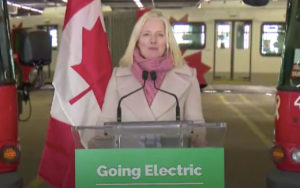The announcement adds substance to the government’s pledge to expand electrified transit and ranges from helping to transition fleets to cleaner fuel sources to the purchase of new electric vehicles

Catherine McKenna, Minister of Infrastructure and Communities, announcing the federal transit funding. Image: CPAC
The announcement adds substance to the government’s pledge to expand electrified transit and ranges from helping to transition fleets to cleaner fuel sources to the purchase of new electric vehicles
The federal government is pledging $2.75 billion towards updating and electrifying public transit across Canada — in particular, to support purchases of zero-emission public transit and school buses to help “deliver” on its commitment to assist in the purchase of 5,000 zero-emission buses over the next five years.
The funding will begin this year. It also comes on top of the previously announced $1.5 billion in funding the Canada Infrastructure Bank is investing in zero-emission buses.
Infrastructure and Communities Minister Catherine McKenna and Minister of Innovation, Science and Industry Francois-Philippe Champagne led the announcement Thursday in Ottawa, offering the latest clarification on how the $14.9-billion fund announced last month by Prime Minister Justin Trudeau will be allocated over its eight-year disbursement period.
“Today’s announcement is important to help make Canada a leader in zero-emission vehicle transportation,” said Champagne in a press release. “The Government is committed to ensuring that Canadian businesses have the tools, support and conditions to become world leaders in a growing economic sector. With this investment, the government is helping these Canadian manufacturers address a growing need here at home to successfully pivot to new, greener products.”
Helping Canadian companies
As the government has made announcements regarding its financial commitment to electrifying and greening Canada’s public transit sector — anchored by its 2020 Fall Economic Statement and the federal climate plan in December — the feedback from industry has been increasingly enthusiastic. Canadian enterprises are hungry for investment from the government to advance adoption and scale manufacturing and as more wheels-on-the-ground vehicles hit the roads the public grows increasingly supportive.
Canadian companies that potentially stand to benefit from the new transit funding include Lion Electric Co. and Nova Bus in Quebec; GreenPower in British Columbia and New Flyer in Winnipeg.
Large cities leading the way in electrified public transit include Toronto, Montreal and Edmonton. Then there are the many smaller municipalities who have taken up the torch to transition. In total, since 2015, the government has helped to fund 1,300 public transit projects.
“Ensuring that Canadians have access to clean transportation options like zero-emission public transit is an important part of our plan to create cleaner, healthier communities,” said Jonathan Wilkinson, Minister of Environment and Climate Change in a statement accompanying Thursday’s pledge. “Today’s announcement will create manufacturing jobs and support the economy, while cutting pollution across the country.”
The ripple effect
Making government dollars stretch as far as possible to benefit the most Canadians across various sectors is an essential part of the public purse being used to finance a Canada-wide transition to electrification.
Stakeholders in cleantech, and the ZEV sector in particular, are calling for greater national effort to establish a supply chain to meet both battery and OEM manufacturing needs. Investing at the end of the chain — in the OEMs and the jurisdictions that will be prospective clients — will trigger a trickle-down effect that could see manufacturing, refining and raw material extraction benefit as well.
“By making this investment, we’re tackling climate change while creating good jobs and supporting manufacturing right now, here at home,” said McKenna in today’s announcement. “Canada’s infrastructure plan invests in thousands of projects, creates jobs across the country, and builds cleaner, more inclusive communities.”






